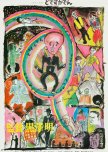
Esta resenha pode conter spoilers
"How many deaths are enough?"
The Lost Bladesman followed part of Guan Yun's epic journey from being Chancellor Cao Cao's prisoner to making his way back to Liu Bei while taking down numerous generals and assassins. I can't judge the film on historical or legendary correctness, only on its entertainment value. The film looked amazing, had several creative and well-choreographed fight scenes featuring Donnie Yen and included Jiang Wen's nuanced portrayal of the inscrutable Cao Cao. Those things were more than enough to keep my attention throughout the film.The film opens with Guan Yun being held prisoner and aiding his injured men. Cao Cao admires Guan's military prowess and seeks to convert him to his side. A man of immense integrity, compassion, and loyalty, Guan Yun largely refused. Guan's only goal was to return Liu Bei's concubine to him who was being held hostage and support his sworn brother. Cao Cao releases him, but his men call upon just about every swordsman in the land to execute Guan on sight. The movie really gets going at this point.
The story was not terribly complex, but a cursory glance at history did help explain a few things that were glossed over for an audience familiar with the tale and characters. I've heard complaints that Donnie Yen didn't look the part. Guan Yun's legend stated that he wielded a 49kg/108lb Green Dragon Crescent Blade, that's like swinging a large child holding an enormous broadsword in battle, not sure who they were going to find who would fit that description. I'm certainly not in the place to judge how a revered legendary character stood up to cultural expectations. I can only offer my opinion how the movie came across as entertainment in my neck of the woods. As the movie played out with numerous fight scenes, Yen did what he does best---fight. His Guan was compassionate and benevolent but he kept being drawn back into bloodshed as he reluctantly faced down the six generals ordered to kill him. Jiang Wen did what he does best---bring a complex character who was thinly written to life. His Cao Cao was the mesmerizing power behind the throne who tried to appear benevolent though many of his actions would say otherwise. Yen and Jiang had great chemistry in their politely adversarial relationship. A half-hearted love story thrown in did not enhance the narrative. The cinematography was nicely done as well as the sets and costumes giving a feeling of authenticity.
If you are looking for historical and mythical accuracy, this may not be the film for you. If you are looking for an entertaining martial arts film with some good performances and a little history added to the mix, this might be for you. I enjoyed The Lost Bladesman more for the fight choreography than for the story. There were several scenes including one in an alley with a reluctant Guan not wanting to kill anyone off the battlefield that were quite exciting. The film did a fairly good job of portraying the man who was a lamb in wolf's clothes and another man who would rather be wrong than be wronged. Both wanted peace, but took different paths to try and reach that unreachable destination. "How many deaths are enough?" History would tell us way too many.
6/16/23
Esta resenha foi útil para você?

Esta resenha pode conter spoilers
"Man is too small when faced with the vastness of nature"
Dersu Uzala was based on the real lives and friendship of Dersu Uzala and Vladimir Arsenyev in the Siberian wilderness during the early 1900's. The impressive film about friendship won an Academy Award for Best Foreign Language Film in 1976. Aside from its famous director, Kurosawa Akira, you aren't likely to recognize any of the names in this Soviet-Japanese film, but don't let that deter you as the performances were all first rate.The film begins with Capt. Arsenyev and his men doing a topographical study of the Ussuri Region. Local hunter, Dersu, enters their camp having followed them for much of the day. The next thing he knows he has become their guide. Dersu is wise, kind, and generous as well as being a skilled hunter. The soldiers are largely unaware of the world he sees and hears around them. "Got eyes but don't see." At first the men are amused at his views, such as fire, wind, and water being alive and "strong men" to be wary of. It doesn't take long for them to come to respect him and trust his guidance. He also teaches them compassion for people and animals in ways they had not thought of in his special lessons on wilderness etiquette.
Arsenyev learns the hard way what disregarding Dersu's advice means in the life and death world of winter in the dangerous world. The two men slowly build on their trust and respect to develop a deep and abiding friendship. The movie could have comfortably ended at the 70-minute mark, and I did find the first half more compelling. When Arsenyev returns to the wilderness he finds his friend older, but largely unchanged. They race to each other and embrace as if soul mates and maybe in some ways they were. Only after an incident with a tiger, do Dersu's facilities begin to decline. The aged tracker and hunter finally relents, acquiescing to his friend's invitation to come live with him in town. Dersu understandably struggles to adapt to the confinement of city living. The film hauntingly ends much as Arsenyev's 1923 memoir.
This film is one that will find itself with a divided audience. There was almost no conflict which could be a deterrent for many, especially with a 140-minute running time. The characters found themselves in few perilous moments or facing life altering events. At the same time, it was an expedition into the beautiful world of the Siberian taiga and the development of a devoted friendship. People from disparate places came to understand each other. The film could almost fall into a slice of life travel drama with its languid, graceful pace.
Kurosawa's signature style appeared throughout the film. An encounter with a tiger leads to a mystical moment for the tracker, a seemingly innocent encounter that had profound effects on his psyche which reminded me of other Kurosawa characters affected by surreal events. Kurosawa's own particular blood red sky and sun also reflected in the ice was used in several scenes, reminiscent of Dodesukaden's sky. A faint rainbow appeared at a hut in the misty woods as happened in several of his films. At times, Kurosawa's signature winds and fog obscured the scenery, heralding in moments of significant changes. The film was beautifully shot in the Russian wilderness and accompanied by an elegant musical score. Rivers, forests, snowy marshes, and a frozen lake shared the screen with actors trudging through and over them. Despite the exquisite landscapes and evolving seasons, Kurosawa kept the story focused on the two men. In one particular segment Dersu and Arsenyev become lost when returning from a frozen lake. At Dersu's bequest they desperately cut the tall marsh grasses in a blinding wind storm for a makeshift shelter in order to survive the bitterly cold night. This scene with few words was stunning and emotionally gripping.
George Lucas has eluded that Yoda may have been loosely based on Dersu. With Dersu's broken Russian and oneness with nature it would be an easy leap in logic. At one point when Dersu was in danger after saving the rest of the men, he had to orchestrate his own rescue advising the men how to accomplish it. While his abilities seemed almost magical to the city folk, his skills were honed over a lifetime living in the harsh conditions needing to always be aware of his surroundings to survive. I believe he would have agreed with Yoda, "Do or do not, there is no try."
Rather than a man against nature theme, the story advocated man living peacefully and reflectively with nature and other people. Nature may be unforgiving, but it was also possible to learn from her and receive her gifts. Kurosawa showed not only the best of humanity but also the cruel face of humanity as well in the way heartless men treated animals and other humans. Though he touched on several subjects the overriding core of the film and its main focus was the friendship of two men from different walks of life who bonded in the wilderness.
It would be hard to overstate the skill Kurosawa used in the making of this film. The raw, scenic landscapes seemed to have personalities of their own, much as Dersu believed. Though the story was simple it was not simplistic. The unbreakable friendship of Dersu and Arsenyev resonated deeply with me. Even at over 2 hours long, I would happily watch this film again.
6/6/23
Esta resenha foi útil para você?

Esta resenha pode conter spoilers
"Hope is within yourself"
Ilo Ilo is a domestic slice of life film played out in a middle-class family's time of challenges during the financial crisis of the 1990's in Singapore. When the mother hires a Filipino nanny to care for her mischievous son, the move only exasperates an already tenuous situation. The deceptively simple story hides layers of social and familial concerns augmented by a capable cast and an unsentimental approach.Lim Keng Teck tries to hide the fact he was fired from his sales job and is now working as a security guard from his wife Hwee Leng, a clerical worker who spends much of her day typing up termination notices. Their son, Jiale, spends most of his time being disciplined at school which causes headaches for his mother. She decides to hire a Filipino nanny to watch over him with the hopes of him staying out of trouble. Hwee Leng doesn't hide the fact she is suspicious of her nanny, holding onto her passport, and thinks less of her due to her status and background, offering her only the plastic to cup to drink out of. Terry is prepared to deal with her employer's condescending attitude but is unwilling to be bullied by a 10-year-old child which she quickly makes clear to the impish and at times, cruel Jiale.
Hwee Leng could come across as difficult to like. However, upon further examination, she was a pregnant mom who worked long hours all while trying to raise a troubled son. Her jealousy of the nanny as Terry's relationship with Jiale became closer was understandable if not particularly admirable. No one was there to comfort her, and she struggled to give comfort to others. Keng Teck was guilt ridden after he squandered much of their savings in the failing stock market. Though he endured the henpecking of his wife affably most of the time, he did crack and explode as well under the strain. Terry had a baby back home she was trying to provide for by working in a foreign country where she was treated as less than. She was fully capable of deception in order to earn some money on the side, but at heart she was a kind woman who managed to break through Jiale's shell. And it was Jiale who was the crux of this family, the desire to give him a good life, to raise him, to reach him that compelled many of the characters. The little lottery obsessed boy who desperately needed to feel loved and seen, who missed his grandfather, was the emotional center of the story that everyone else orbited.
The financial crisis was manifested through the crashing stocks, a shyster financial guru, suicides, firings, and a general air of desperation around the populace. In this little microcosm we were shown the pressure it put on the family and their relationships to each other. The story skimmed over what appeared to be racial and class disparities, the kind not singular to Singapore. Hidden habits like smoking and drinking, secrets kept from spouses, and typical extended family issues were touched on as well during this time of financial downturn.
Yeo Yan Yan, Chen Tian Wen, and Angeli Bayani made for very believable adults adjusting and adapting to their positions, sometimes in a deeply flawed manner and other times with gentle humor. Koh Jia Ler as the naughty yet fiercely loyal Jiale brought a naturalness and vulnerability to the problematic child.
Despite the title Ilo Ilo, which was the province Terry was from, and despite Terry being one of the most sympathetic characters, the story was not told from her point of view. This was a slice of this family's life and much of her background was left unknown. We saw her struggles, yet in the end it was always going to be about whether this family could pull together during a crisis and overcome their anxieties and shortcomings.
Much as in real life, the mood of this film could swing from tears, to anger, to fear to laughter. I would have preferred for some of the elements of the story to have been expanded on and brought to a close but like many slice of life films, Ilo Ilo doesn't tell us how the story ends, we are left to figure that out for ourselves. We can hope the characters take what they have learned and grow as individuals and strengthen their familial bonds but that is up the viewer in the end to decide. If you are looking for a film about family with all the good and bad that comes along with it, this is a film worth trying.
5/31/23
Esta resenha foi útil para você?

Esta resenha pode conter spoilers
No good deed goes unpunished
Three Outlaw Samurai was an entertaining samurai film that supplied plenty of action and more than a few laughs. It felt like a smaller scale Seven Samurai with three samurai who come together to try and save impoverished peasants from a callous magistrate.Shiba Sakon is a wandering samurai looking to find shelter for the night when he comes across a woman's hairpin in the road. An old mill is nearby and either weariness or curiosity compels him to go there. He finds three desperate peasants holding the local magistrate's daughter hostage. Suffering and dying because of recent crop failures, they want to force the magistrate to reduce their tax burden and help them out. Shiba gives them some hostage taking guidance and evens the playing field while they are in negotiation, or more accurately, fighting for their lives. The magistrate orders a samurai named Kikyo, who has been taking advantage of his food and lodging, to resolve the issue for him after his attempt to rescue his daughter and slaughter the peasants failed. Sakura Kyojuro, a vagabond samurai sitting in jail, is recruited by the magistrate along with three murderers to help Kikyo. Sakura grew up as a peasant farmer and quickly changes sides when he finds out what their real mission is. Kikyo, the "Freeloader" as Shiba dubs him, appears to do as little as he can in the distasteful situation.
After a time Shiba is able to reach a deal with the magistrate. He will take the peasants' punishment, 100 lashes, if the magistrate agrees to release him afterwards and spares the peasants. He makes the magistrate samurai pinky swear to uphold the agreement. The magistrate breaks the samurai code and starts having the peasants murdered and a post-torture Shiba thrown into a water dungeon. The local clan lord is arriving soon and the magistrate doesn't want him to know how incompetent he is and also doesn't want the peasant's petition to reach him. He unwisely sends killers after Kikyo which causes the high maintenance samurai to firmly change sides. Now the team is assembled.
This was director Gosha Hideo's first feature film and he nailed it. Narratively, the story flowed and he knew when to pause and when to set the fights in action. Betrayal, corruption, social class antagonism, and even a little redemption arch kept the pauses from being too slow. At its heart, the film was the ancient tale between good and evil and how much or any people are willing to sacrifice for justice. The cinematography, framing and editing all looked great.
The cast was strong with each samurai being his own man. Shiba and Kikyo shared their motivating influences in this exchange. Shiba told Kikyo, "You calculate the gains and losses too much." To which Kikyo responded, " You don't calculate enough." Sakura was a round deadly teddy bear. Though all ended up being likeable, they had their flaws. My biggest complaint is that the band took too long to get together. These actors had a very nice chemistry. Three Outlaw Samurai was a prequel for a tv drama series by the same name that the same actors would star in. My only other complaint would be that the women were portrayed poorly, most were clingy and/or flighty.
The fights tended to be quick and brutal. A number of people only seeking a better life and trying to do the right thing were cut down. A running fight scene was exhilarating and at one point I thought the guys were going to pull a Butch Cassidy and Sundance Kid stunt. After a betrayal and during a huge fight, a character tells Shiba, "You have to kill me!" Shiba sardonically replies, "I'm kind of busy at the moment." It's those moments of levity during a deadly fight against superior numbers that balances the mood of the film.
Despite the dynamic trios' efforts and good deeds-Shiba's torture, Kikyo's character growth, and Sakura's desire for redemption, and the small battles won, the intransigent nature of the corrupted caste system prevailed over justice. In the end, Shiba's idealism and swift sword were unable to cut through the status quo or embolden the peasants' courage. But at least he did not have to suffer his loss alone, he gained two friends to wander the path of the adventurous ronin. Three Outlaw Samurai was not a deeply layered story, but it was an entertaining and fast paced samurai film that fans of the genre might enjoy.
5/20/23
Esta resenha foi útil para você?

Esta resenha pode conter spoilers
"...it's a woman who never falls down."
New Women was a radically feminist movie for 1935 and a bit of a real-life revenge flick as well. Moreover, it was also silent film star Ruan Ling Yu's next to the last film with an ending reflecting her own. Though heartbreaking verging on melodramatic at times, New Women also strove to normalize working and independent women and call out the men who preyed on them.In real life, Director Cai Chu Sheng was rumored to have had an affair with left wing actress and writer Ai Xia. When Ai Xia was savaged in the papers over her private life, she committed suicide. This film was said to be inspired by her struggles. The film also explored the new roles women were taking on in society prompting New Women to be promoted as a film about "the woman question."
Wei Ming (Ruan) is a beloved high school music teacher and aspiring writer. She has written for a local paper and submitted a book to a publisher. Though she is drawn to her book editor he gently turns her down while still supporting her at the publishing house. She is pursued by Mr. Wang, a wealthy married man, the husband of an old school friend. He sabotages her at the school hoping to force her to turn to him. An editor at the paper also tries to seduce her while promising her more work if she is cooperative. Even the local pimp states that with money you can always cop a feel.
Our beautiful heroine is behind in nearly all of her bills. After being paid at the paper she buys a wobble doll with a female worker on top of the globe. She tells the book editor he'd like it because the doll never falls down. Wei has a female friend, Li Aying, who works at a factory and also teaches the women workers to sing songs about being strong and independent. Aying is in a similar boat financially as Wei. To add to Wei Ming's woes, her sister informs her that her husband has died and she must bring Wei Ming's secret daughter to come live with her. Upon her arrival, the daughter is coughing, a sure sign in a Chinese film that the child is dying. The hospital staff informs Wei that the child's pneumonia can be easily cured with the new antibiotics but she must pay upfront for the treatment and the women have nowhere near enough money even after pawning most of what they own. To compound her discouragement, Wei Ming notices the wall of medications and the ward full of empty beds at the hospital ironically named Philanthropy Hospital.
After trying every legal way she can to cobble together the money for her daughter's treatment, Wei's landlady who works with the local pimp tells her that by agreeing to prostitute herself she could earn more than enough money in one night. Regarding a woman's plight, she tells the younger woman, "What other path is open to us?" Desperate to save her child, Wei Ming agrees only to find her wealthy client is the dastardly Mr. Wang. She refuses him and knows that if her child dies, she will follow her.
The film was set in the 1920's as women were beginning to enter the work force causing pushback from the males in charge. As in most countries, women were often paid less, discriminated against, sexually harassed and assaulted with little recourse. Li Aying stated that the new woman is born from hardship. There were different kinds of women presented in the story. Wei Ming was intelligent and focused on earning money with her talent, not her body but because of her beauty and physical fragility the men in charge sought to take what they wanted from her. They used the resources at their fingertips to bring her down and punish her for not acquiescing to their sexual demands. In a time when it had to seem rebellious to the standard quo, she equated marriage with slavery for a woman and felt like one night of slavery prostituting herself would be better than a lifetime. Aying was tough mentally and physically and believed in the Left's view of equality. One of the greatest movie moments in history was when she headbutted a despicable lech---twice! Mrs. Wang was unwilling to rock the boat and risk losing her status and wealth via her close proximity to Mr. Wang's power, thus turning a blind eye to his wandering proclivities.
Ruan Ling Yu gave an enchanting and heartrending performance in a role that not only mimicked Ai Xia's life, but hers as well. When the movie was screened, the press took great exception at being portrayed so negatively and forced the director to make numerous cuts to the film. In retaliation, they printed salacious stories about Ruan which in combination with an ex-lover's lawsuit, possibly instigated by the press, drove her to commit suicide a month after the film's opening.
The movie had some primitive sound effects and dubbing over the intertitles. In the copy I saw, the music became quite distorted at times. Overall, the quality of the cinematography worked well as the director utilized the different camera tricks he had at his disposal. The ravages of time had done some damage to the frames, but not enough to become a distraction.
New Women attempted to break new ground by calling out predatory men and a predatory press. It also sought to give hope to those who had been knocked down one too many times even with the film's heartbreaking ending. When Wei Ming decided she wanted revenge on the men who had brought her low, Aying told her, "…to continue living is without a doubt the prerequisite for doing anything at all!" New Women could feel a tad propagandistic at times but for the most part portrayed women's struggles in the world, especially those who attempted to follow a dream, in a fairly realistic manner. Even after the "Me, Too" movement many decades later, women are still seeking respect and equality at work and in society. When a film entertains and causes the viewer to think, that makes it successful in my book.
5/10/23
Esta resenha foi útil para você?

Esta resenha pode conter spoilers
Where everybody knows ye olden name
Isekai Izakaya Nobu was a sweet drama featuring a wide variety of Japanese bar foods. It was very similar to the Shinya Shokudo series if the chef had been serving patrons from a medieval world with two moons that never waxed or waned differently.The classically handsome Otani Ryohei as Chef Yazawa and his Girl Friday, Takeda Rena as Senke Shinobu opened Nobu and discovered their door led to an alternate world named Aitelia, where apparently the only thing the locals had to eat was wurst and potatoes. There was a small effort to insert some German words in the first episode, and all of the characters had Germanic or English names. Everyone was badly dressed like they were going to a medieval fair, complete with blonde or red wigs.
The locals were dutifully dazzled by things like clean drinking water, beer on tap, glass mugs, and a chef's knife. More so, they yelled and screamed and emoted with every bite of flavorsome food that was offered to them. I suppose if your entire diet consisted of the same boiled food every day, and hopefully the makers of this drama were not implying that European food was that awful, fried chicken would be a reason to rejoice. They tended to lay it on thick in every episode. Despite it being a decent sandwich, I refuse to believe that discovering an egg salad sandwich was a rapturous and life changing event. Opinions may vary.
The regulars included Hans and Nicklaus, two guards of the city along with their boss, the capable Bertholdt. City worker Gernot enjoyed his Pasta Neopolitan (gonna have to trust the Japanese about spaghetti with ketchup) while the local clergy used whatever excuse he could find to join in with a glass or three of sake. The three warring water guild members became fast friends when Chef showed them the glories of eating eel. Of course, no story is complete without a villain and the head of the city council made an appearance to threaten everyone. Could good food and beer conquer all and save the day and the girl?
As fun as the drama could be, the acting was rather weak and campy. It took some time for the story to gain any traction beyond, "Wow! This is a taste explosion in my mouth! How did I never know that salted fish guts was so amazing!" How or why Nobu crossed worlds was never explained. Most importantly, I'm curious how Chef exchanged the Aitelia money to pay his bills in the real world. Did the beer vendor accept foreign, very foreign, gold coins without asking any questions?
The majority of characters were very likeable and most of the food was appealing. Overall, Nobu was an easy and relaxing watch. To quote Yentl, "And though there's nothing much to challenge your mind here, who cares when the food's so delicious?" Nobu might not be a grand destination, but as a quick trip into a pub to relax and have a tasty meal and conversation, it wasn't a bad diversion.
4/9/23
Esta resenha foi útil para você?

Esta resenha pode conter spoilers
"I love a challenge!"
Magnificent Warriors was a fun and fast adventure starring Michelle Yeoh. Set after the Japanese invasion of Manchuria, Michelle, Richard Ng, and Derek Yee had to come to the aid of a small walled village when the enemy decided to use the area and the people to build a poison gas factory. Little did the Japanese army know what they were up against when Michelle landed her biplane outside the city.Michelle's Ming was a pilot who traded in all sorts of goods including weapons. The granddaughter of famed fighter Grandfather Fok played by kung fu movie regular, Ku Feng, she enjoyed using her whip, fists, and kicks to clobber men who tried to take advantage of her. Ming was commissioned by rebel forces to find Agent 001, a rather bland Derek Yee, and also to bring the Kaal village leader, Youda played by music director and composer Lowell Lo, to safety and discover the Japanese plans. Ming's mission was diverted when a nameless traveling conman played by Richard Ng was mistaken for 001. The matter was cleared up soon enough and before long they had Youda and his lover, Chin Chin played by Lau Chin Dai, with them. Ming needed gasoline to fuel her plane which took them into the heart of the Japanese camp which led to the fights and battles that would follow.
This was my second viewing of the movie. Unlike most of these experiences, I actually enjoyed it more the second time I watched it. Mood makes a difference, I guess. While the story was told haphazardly at times, what the film did do well was show off Michelle Yeoh's screen presence and athletic skills. Her fights and enthusiastic attitude lifted the movie when she was onscreen. Some of Richard Ng's early comic scenes dragged on too long, but as the film progressed so did his character's development which made him more appealing and sympathetic. Derek Yee was there, completely overshadowed by almost every other character onscreen. Chin Chin could be annoying, but the character's loyalty kept her from being loathsome. Lowell Lo's Youda, also there for comic relief, was able to have a couple of scenes showing the depth of his love for his people. The pacing could be uneven and answers appeared out of nowhere. All of the characters were archetypes, quite thinly drawn, leaving it up to the viewer to fill in the gaps. The writers tried to remedy this and actually just reinforced their stereotypes when they used a scene where the dynamic group was about to be executed to reveal the three main characters' backstories in an awkward exposition dump right before the miracle that saved them.
The fight scenes were all quite fast and innovative. Michelle was daring in her ability to do her own stunts and as always made the complex moves look effortless. Her early fight with some shady characters over lack of payment was stunning as she used her whip and then quite gleefully a gatling gun. Later, when the Japanese attacked, the Kaal villagers fought with spears and old school ways against the modern weapons of their invaders. The balance of humor and pathos could tip too far with humor when villagers were being killed during the battle. The only scene that didn't work well for me was early in the film when Ming and her biplane were involved in an aerial battle with a Zero. It went on too long and wasn't that interesting. The film utilized several actors and stuntmen I enjoy watching. I was happy to see "Toad Venom" Lo Meng as a silent guard. Fung Hak On, who helped choreograph the fights, showed his fighting skills as a Japanese agent. And Hwang Jang Lee finally had the opportunity near the end of the film to show off his superkick abilities. While the humor could be forced, the final skirmish was a local one that had high stakes for the people involved which weighted the fights with meaning.
Though the villagers and characters suffered consequences for going up against the Imperial army, Magnificent Warriors took a light tone with no spewing blood and severed bodies. The main characters never felt like they were in any real danger as they quipped and smiled through the mayhem. This was Michelle Yeoh's movie and she gave it her all. Magnificent Warriors may not have been magnificent, but it was pretty good.
3/24/23
Esta resenha foi útil para você?

Esta resenha pode conter spoilers
This fish may put you over the limit
If The Legend of Jiang Zi Ya was not a cheaply made movie about the titular character, then it did a good masquerading as one. The CGI was close to home computer level quality. Jiang Zi Ya would most likely be a familiar character to the audience and perhaps that's why the writers glossed over anything resembling character development, but by doing that it significantly lowered the stakes for the characters in the movie.Jiang Zi Ya battles a river demon after it has eaten the parents of a little girl named Phoenix who were fishing on a raft. After imprisoning the river demon, Jiang is called on the carpet by Primus. Primus tells him he must apologize for hurting innocents during his battle with the river demon. Jiang steadfastly refuses and is subjected to 15 years of lightning bolts and then being thrown down to earth as a mortal. The now grown Phoenix rescues him and miraculously carries his bruised and bloody body into her hut. The villagers quickly turn against him thinking he is responsible for another river demon threatening them and try to feed him to the giant fish. He ends up saving a little girl from being eaten and is now hailed a hero. The local earth god shows up and lets the cat out of the bag as to who he is. He sends Jiang to the Mausoleum of Deification to retrieve his Deity Whip. Phoenix who feels indebted to him for saving her life years ago, agrees to accompany him as does Rocky, the idiot who loves her. Rocky is the kind of sidekick who makes sure they leap from the frying pan into the fire on various occasions because of his lack of intelligence and self-control. While escaping an ancient ax-wielding demon, Jiang is hurt. Goddess Phoenix (yeah, I have no idea why she looks just like earthly Phoenix and the writers didn't explain) tells mortal Phoenix to transfuse blood into him. This seems to give him his powers back, but it could be because goddess Phoenix was mixing her blood in, too. Again, no clarification by the writers. They finally arrive at the resting place of the whip but are stopped when a voice tells Jiang if he takes the whip, the villagers will die. Our hero goes back to the village sans whip and now has to battle the river demon who has escaped his prison and is looking for payback.
The ending deals with sacrifice and benevolence. Thankfully, after all the sacrifices the women in Jiang's life made for him he's learned to let go of romantic love. Didn't help those women, but at least he's free to go on his heroic way unfettered to do his Investiture of the Gods work.
The movie relied on primitive looking CGI and the battles weren't exactly tension filled. The fight choreography was simple and unimaginative. Primus looked suspiciously like The Eye of Sauron.
Despite the low quality effects Benny Chan and Niu Ze Meng were likeable in their roles. They fell in love awfully fast. Of course, hers could be hero worship and for him she was a ringer for his girlfriend (who he hadn't seen in 100 years). The acting aside from the main two characters was cringe-worthy. One older woman's job was always yelling someone's name repeatedly when there was danger. "My granddaughter!" "Phoenix!" "Xiao He!" It became humorous after a while. The version I watched used English names for some of the characters in the subs, just to make you aware there are different versions out there.
Aside from the female doppelgänger situation, the story was easy to follow. For the most part it was entertaining despite the cheesy CGI and acting. The ending was a letdown as it used the female sacrifice trope I am well and truly over. I began to think the river demon cleaning house wouldn't be such a bad idea. Clocking in at just over an hour, The Legend of Jiang Zi Ya doesn't require much commitment but it could strain your patience.
3/16/23
Esta resenha foi útil para você?

Esta resenha pode conter spoilers
Monstrously bad
Kung Fu Monster is an uneven comedy that fails with the comedy more often than not. It also fails to live up to its title with very little monster or kung fu.The beginning of the film is all over the place narrative wise, making it very hard to keep up with who is who, especially when some of the faces will never be seen again. To top it off, it's not told chronologically so you just have to go with it until later on when flashbacks explain what happened and to whom, although those events aren't in order either. They leave it to the viewer to figure out what happened. Basically, a group of bandits and rebels gather together to steal the reward for the capture of the Imperial Secret Policeman Si Hai (Louis Koo) who released a furry monster with big eyes that looks a lot like a gremlin from a secret jail because he couldn't train it to be a killer as the evil Eunuch Yehe wanted. He also sprang Bing Bing, the beautiful incarcerated daughter of an executed man. Basically, in for a penny, in for a pound. He's ultimately caught and encased in a coffin to be sent back to the eunuch. Meanwhile, the group of miscreants plan to steal what they think is silver in the coffin by staging a trap at an abandoned inn. All but Bing Bing are furious when it turns out there's no silver, only the wanted policeman. Not a problem, there's a bounty on his head and they are prepared to turn him in. When the furby shows up, I mean monster, now they can collect 30,000 more for it. This being a movie short on logic, of course they change their minds and decide to help, especially when there isn't another choice as the eunuch closes in on them.
There's almost no kung fu, there's a little magic fu, but not much fighting at all. Near the end of the movie there's finally a little monster kung fu, but that's a generous interpretation. So, if you are looking for some good fights, this isn't the movie. They even rip-off the Hulk's funniest scene with Loki from The Avengers movie.
The only thing that actually made me laugh was an officer named Detective White-browed Fei whose white brows were removable. Even when being used as a practice dummy for the gang's knives he was insisting on martial arts decorum. How funny you think the movie is depends on how well you like slapstick and apparently I have a very low tolerance for it. I also have a low tolerance for lots of random events happening just to have something moving the story along.
I found the movie to be too frenetic, jumping from mood to mood. One minute a monster is recklessly charging through the inn, the next there's a romantic dance scene, then death is on the line. There wasn't remotely enough time to develop any of the characters. Most of the actors did the best with what they could for their thinly drawn characters. Zhou Dong Yu gave the most complex performance even though her character was initially very annoying. Louis Koo looked as if he was thinking, "What has happened to my career?" The CGI monster was not the greatest even though it was supposed to be adorable given that it cooed whenever it was onscreen. A "cute" monster doesn’t draw me in unless they give me a reason for it to. It would have also been nice if they'd explained the presence of monsters in the late Ming Dynasty. World building matters.
Kung fu and monsters are two movie genres I enjoy, but this movie was the dumbest and most chaotic movie I've seen in a while. Honestly, the outtakes were better than the movie. Kung Fu Monster should have been fun, but I found myself sympathizing with Louis Koo---someone get me out of here!
3/7/23
Esta resenha foi útil para você?

Esta resenha pode conter spoilers
Two tigers cannot live on the same mountain!
Jackie Chan and Jet Li finally had the chance to team up in 2008's The Forbidden Kingdom. The movie felt like a mixture of Journey to the West and The Wizard of Oz making for an uneven story and one that won't hold many surprises for anyone. There were shout outs to old kung fu movies which will be fun for fans, but a bland American in a fish out of water trope may be more taxing to deal with.Jason Tripitikas (JTTW reference) is a teenager obsessed with old kung fu movies. He frequents Old Hop's (Jackie Chan) shop to buy bootlegged movies like early Shaw Brothers films. One night during a robbery a wounded Old Hop gives him a staff and tells him he has to return it to its owner. Soon Jason is transported back to China in ye olden times. He meets up with drunken beggar Lu Yan (Chan again) and soon he, Lu, and Sparrow (Crystal Liu-her character named after Cheng Pei Pei's famous Come Drink with Me character who also appeared in other Shaw movies, the Golden Sparrow) are being chased by the Jade Warlord's thugs who want the staff, which it turns out belongs to the rock encased Monkey King. Along the way they pick up a monk (Jet Li-who played a lot of Shaolin monks early in his career) and head for the Five Elements Mountain to return the staff to the Monkey King.
Jason is completely inadequate in a fight so Lu and the monk begin to teach him kung fu like two tigers on a mountain. Before you can say "wax on, wax off", Jason is proficient enough to hold his own in a fight. Li Bing Bing plays a White Haired Witch looking to snag the staff so that she can obtain the immortal elixir from the Jade Warlord (Collin Chou in a delightfully campy performance). The movie follows a formula right to the end, even for the female warriors, much to my chagrin.
The cinematography and scenery were gorgeous. Yuen Woo Ping who has choreographed fights for both Jet and Jackie amongst a plethora of other films made the best use of two aging action stars. There were also some humorous fights using the young disciple. The fights incorporated wire-fu and CGI given the characters' super kung fu powers which wasn't unexpected in a kingdom with magical beings. The fight between Jet and Jackie was entertaining and felt like two skilled friends fighting. Jet as the Monkey King was the most relaxed and genuinely playful I've ever seen him.
Due to Jason having to deal with humiliations and set-backs, he didn't come across like a white savior--too much. Jet, Jackie, and the other Asian actors were the people who were proficient and confident and somehow magically speaking English in ye olden times as well as Mandarin. I would have preferred a slightly different ending to the final fight but this was a story to appeal to teenage males. And of course, Jason learned his valuable lessons and took them home to deal with his problems there.
The Forbidden Kingdom could be cheesy and predictable, but is worth watching if you like the stars and want to watch Jet Li and Jackie Chan fight each other and a whole army of people. The fish out of water trope wasn't too annoying and gave the film a message about global friendship and cooperation to solve dangerous problems, something we really need right now in the world.
3/3/23
Esta resenha foi útil para você?

Esta resenha pode conter spoilers
Warning!-This movie might give you indigestion
Kung Fu Chefs was undercooked with no one behind the camera knowing what they were doughing. That's right. This movie was so bad I kneaded to resort to using puns.Sammo, still a delight at 57, played the skilled chef Wong Bing Yi, who was run out of his village when his nephew had the meal Yi had prepared for Ku Feng's birthday a-salted with poison instead of salt and everyone became sickened. The nephew hated Yi because he'd taken the Dragon knife, the family's heirloom, while his dad was drunk and raving which also led to the father being hurt and leaving town. The dad was played by old kung fu actor Bruce Leung. Yi eventually ends up at the restaurant where Bruce had learned his skills and takes over as the chef after besting the current one in a challenge. The restaurant is run by the late master's two daughters, Sam Ching and Sam Ying. The eldest daughter is thrilled to have Yi take over because she is having trouble making ends meat. Vanness Wu as chef Kenichi, coincidentally ap-pears at the same restaurant and begins to study under Yi. The nephew stirs up trouble and Sammo has to put a beet down on him and his henchmen.
What was good--The cooking and the food competitions were actually fun to watch. If you are a vegan/vegetarian you may want to skip this movie as there were a lot of fish and meat prep scenes. Sammo and his stunt double had some very good fight scenes. He was 57 when this film came out and he still had some skillets left. I would like to have seen more of Bruce Leung as well because those two were a recipe for exciting action.
What was not so good—The little sister played by Kago Ai was unrelentingly annoying in what I'm sure was supposed to be a spunky and endearing way. Sexy Vanness Wu ended up having to be the goofy doofus younger cook. Much of the story was focused on these younger people. They simply weren't as ap-peeling to watch as Sammo. Cherrie Ying as the older sister looked like she was thinking that at least she was getting a paycheck. The story was half-baked and not very interoasting.
This film wasn't the wurst, but it could have been much butter. If you like Sammo, cooking, and slapstick humor it might be one to check out. If you don't a-peach-ate any of those things, best to skip it. Oil I can say is thanks for pudding up with my puns.
3/2/23
Esta resenha foi útil para você?

Esta resenha pode conter spoilers
"Why hadn't I been kinder?"
Kurosawa Akira tackled Dostoyevsky when he gave his interpretation of the novel The Idiot. The story was a morality tale of what happened to an innocent lamb in a den of wolves, even when friendship and love had been professed by all.Kameda had been accused of a war crime and was about to be executed when he received a reprieve. He was summarily acquitted, but the damage had been done. He developed what the film called epileptic dementia. Kameda was reborn a kind man with a pure spirit. He had developed the ability to look into people's eyes and see into their soul, their kindness, their sorrow, their rage. After spending time recuperating in an asylum, he chose to travel to his last known relative.
On the train to Hokkaido, Kameda made friends with Akama. Akama was as brutish as Kameda was serene but the rough man took a liking to the gentle one. Akama was on his way to Sapporo to marry Taeko, a sad, beautiful woman who had been Tohata's mistress since she was fourteen. Tohata had decided to dismiss her and was offering a 600,000 yen dowry to whoever would marry her. With the death of his overbearing father Akama had received an inheritance and he was prepared to pay to have Taeko be his. Kameda also had received and inheritance, but what he didn't know was his relatives had already taken possession of his property.
Kameda met Taeko and found a lost and kindred spirit. He saw a pure soul in her buried under the shame and suffering. Taeko's exterior was as frozen as the ice-covered statues outside, but melted when for once someone respected her and she fell immediately for Kameda. Akama burst onto the scene with 1 million yen and was not looking to take no for an answer. Taeko threw the money into the fireplace and chose Akama. She knew that if she went with Kameda she would ruin him, Akama was the kind of man that even if she ruined him, it would not matter. As Kameda would later observe, she destroyed everything good that came into her life.
Afterwards, Kameda and his relative's daughter, Ayako, began to see each other. Jealous and conflicted, Ayako oscillated between love and hate for Kameda and his friendship with Taeko. Akama suffered the same fate except with a hotter hate and jealousy toward both Kameda and Taeko. Akama turned abusive toward Taeko because he knew she didn't love him and he harbored murderous thoughts for his friend Kameda.
For nearly the whole film, blowing snow pelted the characters. Piles of snow flanked the sides of the road and covered the roofs. The dark, cold world perfectly fit the mood of this film. Eventually, the buried feelings would explode with the heat of the flickering fire in Akama's wood stove leading to a tense, emotional scene as Kurosawa marched them in circles ever closer and closer to the long-awaited culmination.
Akama and Kameda were like the devil and the angel on Taeko's shoulders whispering which way she should go. Kameda didn't have any business sense or desire for wealth. He did, however, face every person and problem with kindness and understanding which earned him the name Idiot. Though he had been in an asylum for treatment, other characters would display for more frightening madness than he ever could. He showed compassion, others showed deadly obsession, envy, and dangerous emotional swings.
Mori Masayuki gave Kameda an almost angelic bearing, a difficult character to play. Some scenes he was more successful than others in breathing life into Kameda. Mifune Toshiro and his animalistic energy surged against the calmness of Mori's performance. Hara Setsuko playing against type with her often sunny performances, plumbed the depth of the darkness of Taeko. The youngest of the love square, Kuga Yoshiko, did what she could with the complex character of manic Ayako whose emotions flipped back and forth almost in the same breath. Mori was 20 years older than Kuga in real life, who was only 20 years old when the movie came out, and they looked an odd age match, made even odder since she was a relative in the story.
At the beginning of the film there were dozens of characters, but only Kameda, Akama, Taeko, and Ayako truly mattered, the rest were simply the chorus explaining why people thought Kameda was an idiot and giving voice to their concerns about him and finally understanding that he was too beautiful for a cruel world.
The pacing could be odd at times. The use of intertitles was very disrupting but that was not Kurosawa's fault. Initially, the film was going to have two parts, with a run time over 260 minutes. The production company cut 100 minutes from the film and summed up some of the first act with the intertitles. In all honesty, it might have been for the best. I really don't see how this film could have remained remotely compelling at 4 ½ hours even with adding more fully developed backstories. Nearly three hours was enough for me.
The Idiot can require some patience with its slow, melodramatic journey through what felt like an eternal and unrelenting winter. The only warmth and light came from Kameda loving the unlovable, forgiving the unforgivable, and facing a cruel and treacherous world with an open heart. In the end, those who remained came to realize the real idiots were the ones whose love included hate.
He was a "…genuinely good man. It may seem ironic choosing a young idiot as his hero, but in this world, goodness and idiocy are often equated. This story tells of the destruction of a pure soul by a faithless world." (The Idiot intertitle)
2/28/23
Esta resenha foi útil para você?

Esta resenha pode conter spoilers
Cheap Fast Food!
Detective Song Ci is loosely based on the first forensic entomologist and the author of Collected Cases of Injustice Rectified. I suspect reading his 1000 year-old forensic science book would be more entertaining than this short, cheap, confusing movie.The story bounces around more than a ball at an octopus ping pong tournament. Detective Song is called in when a man is murdered at home. He solves the crime in seconds which freed up his schedule to deal with a mysterious mass murder of the Li family in the Tonggu County. Creepy straw men are hung where the people disappear, their bodies buried elsewhere. By his side is his trusty deputy Han dressed like a typical historical bodyguard. A young woman also drops in from a roof and joins him in the investigation. She has a jade pendant much like the Li family carries and she's looking for her parents. At the same time Grand Censor Ding, and Song's boss, has his hands full with the Emperor who wants to travel to Tonggu Co. to visit his old teacher who is ill. Ding forbids anyone to talk about the straw man murders under penalty of arrest, including Song. Even though not one constable had been aware of much less able to stop any of the murders of the prominent family they are quick as bunnies to arrest people whispering about the case. Song deduces that the killers are using blood thirsty insects to kill their victims. Before long he realizes events and people are not as they seem.
The movie is needlessly confusing at the beginning when much of the action is going back and forth without people being properly introduced. Eventually, names and titles are given to most of the characters which helps to sort the story out. At the end when the nefarious plot is revealed, a dying character has to use his last couple of hundred breaths to tell the convoluted tale. Some of the characters are still an enigma as the credits roll, there simply wasn't the time to develop them.
The production values were quite low. I did enjoy seeing old kung fu movie actor Norman Chu in his role. Norman's General Censor costume was much nicer than the clueless Emperor's. The fighting was of the most rudimentary style and they couldn't even get the buckets of spurting blood to look better than a 1970's kung fu flick. Norman must have felt right at home. Most of the acting was perfunctory with some of the worst dubbing I've ever heard. Along with the atrocious dubbing were the sound effects that were so amplified as to be literally laughable. When several women were walking on a dirt path further from the action, they sounded like a herd of horses walking by. Music overrode the dialogue at times. They couldn't even muster the money for a proper entourage and palanquin for the Emperor.
If you have an hour you need to kill and want to see a low budget movie with a big body count and a low rent Detective Dee or Sherlock Holmes, you might want to give this one a try. Otherwise, better to watch Detective Dee or even The Great Mouse Detective than this one. Song Ci deserved much better.
2/24/23
Esta resenha foi útil para você?

Esta resenha pode conter spoilers
"It's like a bucket of sand poured over my head"
During Japan's economic boom period, Kurosawa Akira made a film about those who did not benefit from it, living on the fringes of society within or next to a large trash heap. Dodeskaden was his first film in color and he took full advantage of it with brightly painted backdrops and buildings. The colors did not translate into the drab, tragic lives of the people who lived there, as they continued moving in endless circles unable to escape their meager existence.The film begins and ends with teenage Rokuchan and his mother as they chant their Buddhist mantra. The mentally challenged teenage boy believes himself to be a streetcar operator and each day he goes out to his imaginary streetcar and runs his routes through the shanty town. As he "drives" along, he calls out "Dodeskaden", the sound a trolley makes. Out of all of the characters, his full imaginary life might actually be the happiest. Other characters are not so lucky, an overworked niece becomes a victim of rape, a man who saw something he shouldn't have walks around unspeaking with dead eyes, a father and son live in a car with the son begging for their food in town when they need it, and a man with a distinctive facial tic has to put up with a harridan for a wife. For comic measure two day worker drunks swap wives and the viciously gossipy Greek chorus of woman who gather around the water pump give their commentary throughout. A man who makes hairbrushes has a wife who has given him five children with a sixth on the way with none of them being his. And lastly there is the old village saint who tries to help where he can.
Kurosawa has vilified the upper classes and their consumerism in other films. In this one he shows the plight of society's outcasts. Much like The Lower Depths, he doesn't make the characters sympathetic for the most part, only the youngest and most vulnerable who suffer bitter fates. Most of the characters don't truly interact, only tied together by proximity.
While Kurosawa's skill shows through as well as the actors, I can't say I particularly liked this film. Justice hides her face. Redemption is but a dream. And hope is so far in the distance that most people live their lives in resignation to their lots. With the exception of dutiful Rokuchan's mother, women are portrayed as harpies and harlots, completely untrustworthy and for the most part interchangeable. The men are given much broader range from mentally ill to lazy to drunkards to industrious to kindly generous to wise old sage.
With all the drudgery and tragedy, a few moments of quiet and joy exist even when only in the imagination. There are beautiful surreal paintings of the house the father and son build together in their minds while starving in the car. Rokuchan's drawings of streetcars on every surface in their hut and his imaginary world are quite vivid. The wise sage tricks a suicidal man into wanting to live and stuns a burglar in his house with generosity. Those gentle moments are few and far between.
Despite Kurosawa's skill behind the camera and the general resilience of the people living on the outside of society, the flat, negative portrayal of women, and the relentless negativity dragged this film down for me. To quote one of the characters, "It's like a bucket of sand poured over my head."
2/22/23
Esta resenha foi útil para você?

Esta resenha pode conter spoilers
"A swan among chickens"
Red Heroine is the oldest surviving wuxia film and the oldest surviving Chinese film to have a female action star! The Burning of the Red Lotus Temple came out first but sadly that one is lost to the ages. I was delighted to find this piece of wuxia and feminine history.Fan Xue Peng starred as Yun, a mild-mannered girl living in tiny Mulberry Village with her blind and paralyzed grandmother. A band of bad guys was fast heading there but her grandmother refused to leave. When the wealthy neighbors show up and ask to help take her away, grandma refuses. Finally, when cousin Jin Zhang arrives, grandma agrees to be carried. There was only one narrow dirt path going into and out of Mulberry Village but somehow Yun and Jin Zhang become separated. The Big Bad, Zhi Ma, captures her and takes her back to his fortress. Grandma ended up pummeled under horses' hooves as Yun was carried away.
Zhi Ma has a bevy of half-naked ladies serving him in his fortress, quite risqué for the time. Yun resists him until she is fortuitously rescued by the Taoist kung fu master White Monkey. The paradigm for a thousand martial arts films that will follow is laid out. A Loved One was killed. After being Threatened and Humiliated, Yun vows Revenge. But she fears she's too weak and powerless to do any good. Honey, that's what the Training Montage is for, but that must have been a later development. White Monkey, a Master, vows to train her with his Secret Sauce Fighting Technique and make her revenge ready. She later Flies in and storms the fortress and demolishes her enemies all in a very Exotic looking Costume.
The formula would have worked if they had known about one key part of it. The middle section of the movie dragged because it focused solely on secondary characters and the bad guys’ lair. The film would have benefited from a training and inspirational montage for Yun so that we could see her transform from timid maiden into the Red Heroine. Perhaps the writers wanted us to be surprised when she suddenly shows up later. When Yun, now the Red Heroine, came flying in, literally, disappearing and appearing in a puff of smoke, it was exciting, though almost too late to save the story from the middle act doldrums.
My favorite scene was after doing battle with some baddies, the Red Heroine paused a moment to catch her breath and roll up her sleeves before jumping on the Big Bad. I could almost hear her thinking, "a woman's work is never done."
This was definitely a low budget film. Much of the time people were either walking or riding back and forth on the narrow dirt path, it really did need at least two lanes as much traffic as it saw. Or people were going up and down the open staircase in the fortress, usually forcing captured women up it. Lastly, one window in the harem's dressing room needed a revolving door as much action as it saw with people climbing in and out it with the rope so thoughtfully dangling outside from a nearby pole.
The martial arts, mostly sword fighting and flipping people onto the ground, was more sword dancing than 1970's era blood spurting kung fu but for 1929 was entertaining. The student must have surpassed the master because she could fly and appear and disappear in a puff of smoke while her old master traveled via a donkey or running. I was quite pleased that they allowed her to kill her enemies instead of having to be daintily magnanimous with them. "The evil receive their due retribution."
The version I watched had no music though I've read that a score was added at a later date. The film has suffered through the years, with some frames so badly blown out that you couldn't see what was happening. It seems it may have been cropped as well. There were both Chinese and English intertitles, but they were cut off on the sides. Fortunately, there were better English titles below those which helped enormously as the original English subtitles were difficult to understand. I did love Yun's cousin being referred to as her cousinbrother in those subs.
Another trait that continued on into the 1970's was hammy acting. I've seen other old silent films and this movie won the award for mustache twirling and overwrought responses. The director also made liberal use of flashbacks and prosthetic goofy teeth. Many of the costumes were over the top as any good kung fu movie would have. I'm sure if it had been available the bad guy costumes would have been made of silver lame. While I'm riffing, one bad guy had the biggest sword I've ever seen. It screamed over compensation.
This was #6 in a 13-part serial, of which none of the other films survived. I have no idea if Red Heroine's character was in more of the films or not, but maybe that's why Yun didn't figure prominently in the middle of a film named after her. Unfortunately for them and us, China outlawed the popular wuxia films in the 1930's. For the most part this was a nicely feminist film in places. Red Heroine made her own choice to be trained and seek revenge on her grandmother's killers and was allowed to kill her enemies. The cousinbrother would not set aside the women he'd become attached to during Yun's absence even though the woman had been "sullied". "Love is sacred, nothing can contain it."
Red Heroine was entertaining even if it dragged badly during the long stretch without the titular heroine. This is probably a film only for martial arts movie enthusiasts. I thoroughly enjoyed being able to see the launching of this genre into filmdom, especially with a female hero who wasn't afraid to roll up her sleeves and get her sword dirty.
2/16/23
Esta resenha foi útil para você?

 55
55 223
223 11
11






















